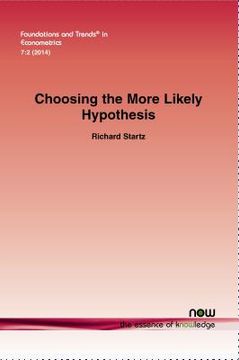Share
Choosing the More Likely Hypothesis (in English)
Richard Startz
(Author)
·
Now Publishers
· Paperback
Choosing the More Likely Hypothesis (in English) - Startz, Richard
$ 54.74
$ 65.00
You save: $ 10.26
Choose the list to add your product or create one New List
✓ Product added successfully to the Wishlist.
Go to My WishlistsIt will be shipped from our warehouse between
Tuesday, June 25 and
Wednesday, June 26.
You will receive it anywhere in United States between 1 and 3 business days after shipment.
Synopsis "Choosing the More Likely Hypothesis (in English)"
Much of economists' statistical work centers on testing hypotheses in which parameter values are partitioned between a null hypothesis and an alternative hypothesis in order to distinguish two views about the world. Our traditional procedures are based on the probabilities of a test statistic under the null but ignore what the statistics say about the probability of the test statistic under the alternative. Traditional procedures are not intended to provide evidence for the relative probabilities of the null versus alternative hypotheses, but are regularly treated as if they do. Unfortunately, when used to distinguish two views of the world, traditional procedures can lead to wildly misleading inference. In order to correctly distinguish between two views of the world, one needs to report the probabilities of the hypotheses given parameter estimates rather than the probability of the parameter estimates given the hypotheses. Choosing the More Likely Hypothesis shows why failing to consider the alternative hypothesis often leads to incorrect conclusions. It shows that for most standard econometric estimators, it is not difficult to compute the proper probabilities using Bayes theorem. Simple formulas that require only readily available information in standard estimation reports are provided. The author emphasizes that frequentist approaches for deciding between the null and alternative hypothesis are not free of priors. Rather, the usual procedures involve an implicit, unstated prior that is likely to be far from scientifically neutral.
- 0% (0)
- 0% (0)
- 0% (0)
- 0% (0)
- 0% (0)
All books in our catalog are Original.
The book is written in English.
The binding of this edition is Paperback.
✓ Producto agregado correctamente al carro, Ir a Pagar.

